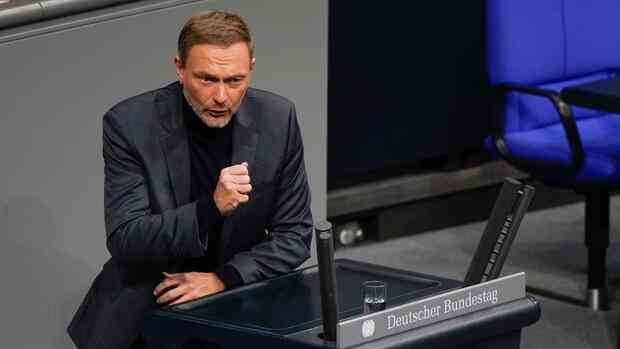The Finance Minister did not have to fully exhaust the 2022 debt framework.
(Photo: IMAGO/photo booth)
Berlin Federal Finance Minister Christian Lindner (FDP) incurred significantly less new debt in 2022 than originally planned. According to the preliminary budget, net borrowing amounted to 115.4 billion euros. The budget provided for 138.9 billion euros. New borrowing was thus EUR 23.5 billion lower.
The reason for this is that the Treasury took in around nine billion euros more in taxes than estimated. At the same time, it spent around 14.5 billion euros less than planned at 481.3 billion euros.
“On the one hand, the budget statement shows that we do not exhaust all legal possibilities of borrowing by hook or by crook, but only to the extent necessary,” said Lindner. “On the other hand, it shows that planning and approval procedures have to be accelerated so that investment funds are really used.” There is not a lack of money – but rather a lack of speed due to bureaucracy.
In 2022, capital expenditures were only 46.2 billion euros instead of the estimated 51.5 billion euros. This is also due to the fact that the Federal Employment Agency did not take advantage of a loan that counts as an investment as planned.
Top jobs of the day
Find the best jobs now and
be notified by email.
Crisis spending was also not as high as feared. Lindner launched a supplementary budget last year because of the consequences of the Ukraine war. Around five billion euros of the corresponding provision item were not used. And the expenses for the pandemic were also 2.6 billion euros lower than planned. However, total federal spending in 2022 was still significantly higher than before the pandemic.
Shadow budgets total 300 billion euros
In addition, the federal government took on additional debt in shadow budgets last year. This includes the special fund of 100 billion euros for strengthening the Bundeswehr. No money has yet flowed out here, but contracts worth ten billion euros have been concluded.
To deal with the energy crisis, the federal government has borrowed 200 billion euros from the Economic Stabilization Fund (WSF). Of this, 30 billion euros were used last year. The main aim of the WSF is to finance the gas price and electricity price brake. Since market prices have recently fallen, householders have hope that the 200 billion euros will not be needed in full.
More: How much prosperity the crisis is costing Germany
